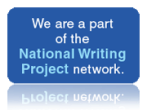Obituary of a Teacher-as-Examiner: Notes from the Summer Writing Institute
The Pennsylvania Writing and Literature Project (PAWLP) is a regional site of the National Writing Project (NWP), whose goal is to improve writing and learning in the nation’s schools. Each year, PAWLP and Writing Projects across the nation invite experienced, talented educators to study literacy development and the teaching of writing in a relaxed, collegial atmosphere. Institutes support teachers as readers, writers, and as researchers of their own literacy practices. Institute participants have ample opportunity to read and write and to reflect on their experiences as readers and writers. The Institute functions at various times as a seminar, workshop, and laboratory. A reflective inquiry stance allows participants to define, refine, and revise their thinking. Below, 2015 PAWLP Institute Fellow Jason Fritz shares excerpts from his Institute multigenre inquiry project: “Students’ Perceptions of Writing” Fiction Piece: Obituary of the Teacher-As-Examiner Role.
“Even with the changes that have taken place over time, however, the large majority of the writing students do is still to the teacher-as-examiner” (Applebee & Langer 2011).
Obituary of the Teacher-As-Examiner, 37
Teacher-As-Examiner died suddenly on Thursday, July 16, 2015 at the Front of the Classroom due to complications following an intensive three-week PAWLP Summer Institute where he continuously took an inquiry stance. He was 37.
Teacher-As-Examiner was predeceased by his father Didacticism and his mother Banking Model. He is survived by his brother Constructivism and his sisters Deconstructivism and Auto-Didacticism. Teacher-As-Examiner enjoyed long talks in the classroom and taking center stage in learning experiences. He was fond of the Initiate-Respond-Evaluate pattern of interaction with his students. He frequently credited his parents for his approach to students.
Teacher-As-Examiner was known for his ongoing feud with John Dewey, Lev Vygotsky, and Paulo Freire, who felt that he was an inefficient and oppressive pedagogue. Teacher-As-Examiner cited his long history in the educational system in response to their accusations. In his final days, Teacher-As-Examiner took on a more conciliatory approach, taking his brother’s advice and joining an ongoing professional development experience in PAWLP. His experiences lead him to revelations about teaching that were too much for his heart to handle.
Teacher-As-Examiner will be thoughtfully remembered by many for the way that he taught. His good intentions inspired his brother and sisters to innovate and leave a legacy of their own in the field of education. In lieu of flowers, donations may be made to the National Writing Project.
___
End-note:
There are different roles that a teacher can play in writing instruction. Through the years, teachers have typically defaulted to the examiner role, an evaluative stance that is more concerned with the teacher imposing his or her view of writing on the student as opposed to the teacher listening to the student’s perceptions of writing, interrogating that view, and allowing the inquiry process to shape the student’s thinking. In my fiction piece, I created what I think represents my greatest realization while at the Summer Institute, and that is the limitations of the teacher-as-examiner role. Living and breathing inquiry as stance and constructivism on a daily basis at the Institute really drove this point home for me. Consequently, as my awareness of the limitations of the teacher-as-examiner role grows, so does my desire to embrace the teacher-as-listener role. In fact, predominantly taking on this role is my primary goal for the upcoming school year. I am indebted to Mary Buckelew and Brenda Krupp of the Summer Institute and my dissertation chair, Diane Waff, for opening my eyes to this.
 Jason Fritz currently teaches 10th and 12th grade English at Harriton High School in Rosemont, PA. Currently a doctoral candidate in the Reading Writing Literacy program at Penn GSE, Jason is interested in what happens when a teacher listens carefully to students’ perceptions of themselves as writers, their attitudes towards writing, and their perspectives on classroom writing instructional practices. Jason is a board member at A Better Chance in Lower Merion where he and his wife are also proud host parents. He is an award-winning poet who writes daily.
Jason Fritz currently teaches 10th and 12th grade English at Harriton High School in Rosemont, PA. Currently a doctoral candidate in the Reading Writing Literacy program at Penn GSE, Jason is interested in what happens when a teacher listens carefully to students’ perceptions of themselves as writers, their attitudes towards writing, and their perspectives on classroom writing instructional practices. Jason is a board member at A Better Chance in Lower Merion where he and his wife are also proud host parents. He is an award-winning poet who writes daily.




I, too, will have new life in my classroom this coming September after the end of some of my old teaching ways.
LikeLike
Jason,
I am looking forward to reading more of your writing and interacting with you in education/PAWLP. Your piece reminds me what I realized after completing the Writing Institute–and I tell everyone every chance I get–immersion in the evidence and seminal research, makes me want my first fifteen years of teaching back. Yet, what good would that do? I’d relieve my same mistakes, I think. Your piece reminds me that it is the evidence and our experience and our humility which shapes where we go now. Looking forward to meeting you at that next point.
LikeLike
Well done, demo partner! Thank you for a thought-provoking piece to carry through the end of summer. Best of luck this year in your endeavor to inquire.
LikeLike
Jason,
This was creative and well written! Wishing you a inquiry filled school year this Fall!
LikeLike
Jason,
Brenda and I truly appreciated the way you used the Obituary as a mentor text — and we also found your inclusion of theory, satire, and honesty to make it a thought-provoking — yet fun piece. We’ll echo Tom — Clever piece! Thank you for sharing both Pieces: “Obituary of Teacher-As-Examiner” and your multigenre end note.
LikeLike
Clever piece, Jason! It was great working with you this summer.
LikeLike